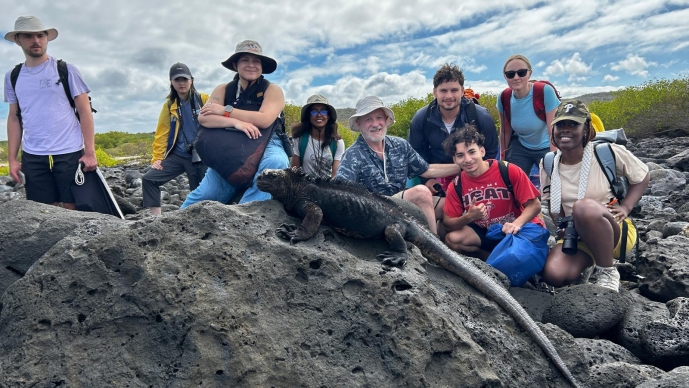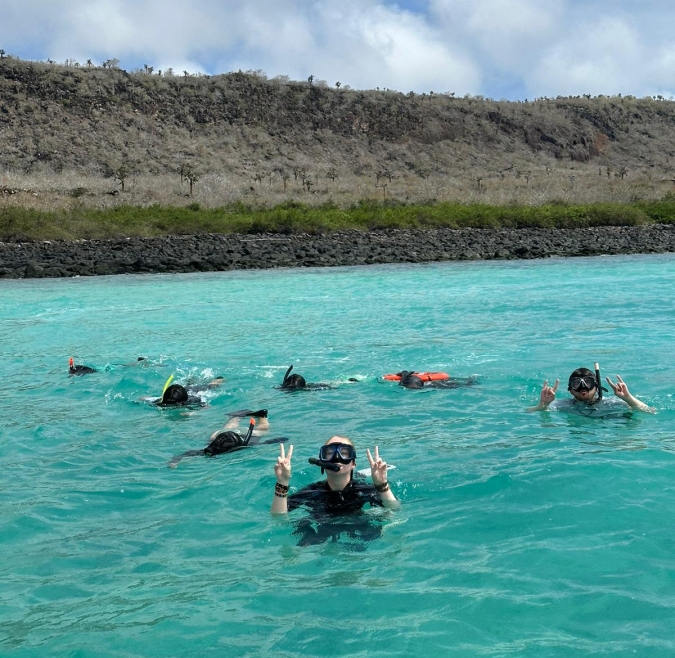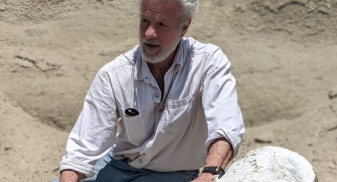Summer: Rutgers- Galapagos Archipelago. Natural History and the development of evolutionary thinking
The Program
An immersion in its natural history, conservation challenges, and role in the development of evolutionary thinking.
This course will immerse students in a holistic learning experience on the natural history of the Galapagos Archipelago, as well as on its historical role in the development of modern evolutionary theory.

Program Locations

Ecuador
The Galapagos archipelago
The Galápagos Islands are an archipelago of volcanic islands in the Eastern Pacific. Through this program, students will achieve a good understanding of the biological, ecological, and environmental characteristics of the Galapagos Archipelago. They will also learn the geological processes that led to the formation and evolution of the islands as well as explore the ecological, evolutionary, and biogeographic processes that determined the occurrence of present-day endemic flora and fauna. Students will examine how anthropocentric activities, including fisheries, habitat degradation, species introduction, poaching, and tourism, impact the local fauna and flora, as well as the conservation actions currently in place, what positive results have been achieved, and what conservation actions are still needed.
Academics
This course will be divided into two main components. One, lecture-based, will entitle six classroom meetings and will cover the biological, geological, environmental, and conservation characteristics of the Archipelago, as well as the processes that explain the origin, patterns, and evolution of its biological diversity. In addition, it will cover both the significant role the visit to the Galapagos had in Darwin’s development of his theory on the origin of species and formulation of natural selection as the primary mechanism of evolution, and the misconceptions still frequently present in both the media and academic settings.
The second component is the travel to the Galapagos Islands, where the students will learn, in such an extraordinary natural setting, the ecological, geological, evolutionary, environmental, and historical aspects studied in the classroom. Students, under the guidance and supervision of the lead faculty and local naturalist guides, will survey at least ten islands including those visited by Charles Darwin during his voyage with the Beagle. Students will engage in numerous daily activities, including trekking to learn vulcanism and other geological processes still ongoing, and snorkeling in shallow bays where they will see distinct coastal communities, learn about ecological processes, and witness unique animal behaviors.
The fieldwork will provide students with the exceptional opportunity to observe in nature the classical textbook examples of adaptive radiation and adaptation they will study prior to the trip. For instance, students will identify species of “Darwin finches” (Geospizia spp) and mockingbirds (Nesomimus spp), observe their main morphological differences (e.g., size and shape of the beaks in finches), their microhabitats, and feeding behaviors. Students will be able to closely interact with the remarkable endemic fauna of the Galapagos, including marine and land iguanas, lizards, giant tortoises, sea lions, penguins, sea birds, and invertebrates. Students will learn about the particular oceanographic environment where the Archipelago is situated, the upwelling nutrient-rich currents that sustain such extraordinary biodiversity, and how the local ecosystems are impacted by El Niño events, as well as learn the main conservation challenges facing Galapagos. Students will keep a daily log and will take field notes and photographic documentation during each field activity.
This program offers unique opportunities for students interested in various aspects of organismic biology, wildlife management, and conservation, environmental education, as well as and in the development of scientific hypotheses, in particular the evolutionary theory. It provides an exceptional background for learning speciation, adaptive radiation, and other evolutionary mechanisms
Read this article about Professor Vagelli's travel courses https://camden.rutgers.edu/news/professors-passion-biology-inspires-once-lifetime-courses
Housing and Meals
Breakfast and box lunches are included most days. Students are responsible for dinner.
Students will share double rooms in hotels.
Financial Information
Program Costs
| NJ Resident | non-NJ Resident | |
|---|---|---|
| Undergraduate | $5,550 | $5,900 |
| Graduate | $5,770 | $6,100 |
Program Cost includes:
- Tuition
- Housing
- Breakfast and lunch
- In Country Transportation
- Excursions
- Administrative Fees
- Emergency Medical Access Abroad
Out-of-Pocket Costs
| Airfare | $1,000 |
| Meals | $200 |
| Personal Expenses | $200 |
| Total | $1,400.00 |
Out-of-Pocket Cost includes:
The above costs are estimations and represent the known out-of-pocket costs students encounter during their time abroad.
Some of these expenses will be paid for prior to going abroad, such as an airline ticket, while some of these expenses, such as meals and personal expenses, will be paid in-country as part of your daily expenses. As you plan, you will need to budget these costs and spend wisely throughout your time abroad.

